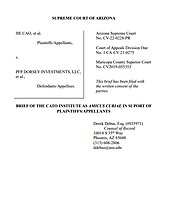Learn more about Cato’s Amicus Briefs Program.
We all wish we could force unwilling sellers to transfer property to anyone we prefer, including ourselves. But in a country that respects private property rights, we can’t always get what we want. The Founders made sure of it by including a Takings Clause in the federal Constitution and most state constitutions (including Arizona’s) do the same. These clauses prohibit the government from taking property for some other party’s purely private use. And even when government takes property for public use, it can only do so if it provides the property owner with just compensation.
An Arizona law, however, violates that bedrock constitutional principle. Under the Arizona Condominium Act, a supermajority of condo owners can force a minority of condo owners to sell their units against their will. That’s exactly what happened when an LLC called PFP Dorsey Investments bought ninety out of ninety-six units in a condo building in Tempe. That was enough to allow PFP Dorsey to force a sale of the remaining six units to itself— never mind that the remaining owners, including Jie Cao, did not want to sell. The Arizona court of appeals ruled the Act unconstitutional on its face and the Arizona Supreme Court granted review.
In our amicus brief to the Arizona Supreme Court, we argue that the law is unconstitutional and terrible policy. The primary justification for the Act is to prevent “holdouts,” that is, property owners who supposedly strategically refuse to sell at market price to compel extra compensation. In theory, such holdouts hinder economic development projects and their alleged trickle-down effects.
The truth is different. Multiple studies have shown a strong connection between protection of property rights and economic well-being, including increased income per capita. Nations with similar languages, cultures, and traditions have greatly disparate Gross National Income (GNI) per capita depending on their respect for property rights. South Korea’s GNI is at least 17 times the income of North Korea’s, Finland’s is between 2.5 times and more than 7 times Estonia’s, and Taiwan and Hong Kong’s are both more than four times China’s. The sheer benefit of property rights justifies their enforcement.
Moreover, eminent domain abuse causes more harm than the holdouts supposedly cause. Even assuming some takings provide a net benefit, the government cannot be trusted to ensure that eminent domain is used primarily for beneficial takings. The government consists of flawed, corruptible humans who often wield their power opportunistic ways rather than to correct the hold-out problem. Our brief offers many instances of such abuse. In the early 1990s, for example, Bremerton, Washington, settled a suit about odor complaints from a sewage treatment plant and agreed to install odor controls. The city then condemned 53 homes near the sewage treatment plant, including one owner’s home of 40 years, supposedly to create an odor easement. However, days after the condemnations were finalized, the city rezoned the land and sold it to a car dealership for $1.99 million. The city never created an odor easement.
In 1997, Hurst, Texas, used eminent domain to seize 127 homes to expand a real estate company’s mall, hoping to increase sales and property tax revenue. Ten couples, who had lived in those homes for as many as 30 years, sued to stop the condemnations. The trial judge refused to stay the condemnations while the suits were ongoing, so the residents lost their homes. The judge also refused an extension to a resident whose wife was in the hospital for brain cancer, forcing him to leave her bedside to move out his belongings. A total of three couples died and four others suffered heart attacks during the litigation. There was evidence that the land surveyor who designed the roads for the mall was told to change the path of one road to run through eight of the litigants’ houses. After years of litigation and receiving no compensation, the families were forced to settle.
In contrast, the holdout problem is not as problematic as some suggest; economic development has long managed to succeed despite holdouts. In 1902, Macy’s decided to move its flagship New York store to the corner of 34th Street and Broadway. The new store was planned to cover the entire block. However, the owners of the competing Siegel-Cooper Co. bought one parcel on the corner of the block to bargain for a lease of the old Macy’s location. Macy’s thwarted this plan by refusing to negotiate, and it instead built the store around the tiny parcel. Macy’s has never owned the parcel since, but it advertised on the parcel’s exterior from the 1940s until Amazon outbid it in 2021. Despite Macy’s being unable to get part of the property it sought, it still successfully built the store and even leased the holdout parcel for advertising space. We detail several more examples in our brief.
In sum, our Constitution, and Arizona’s, protects property owners’ ability to hold on to their property even when others would rather see it go to economic development projects that benefit third parties. The Condominium Act directly contradicts that foundational principle.

This work is licensed under a Creative Commons Attribution-NonCommercial-ShareAlike 4.0 International License.


